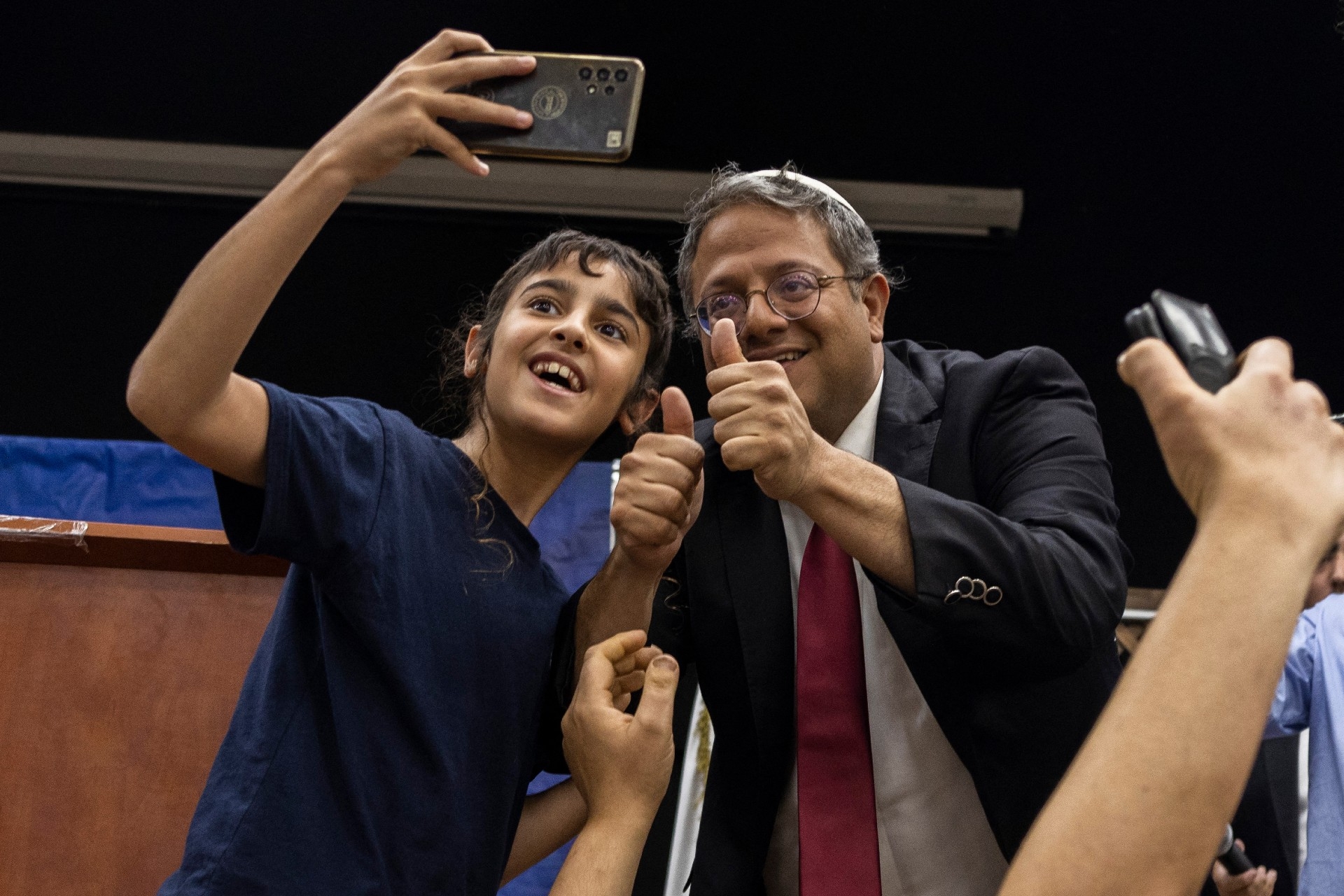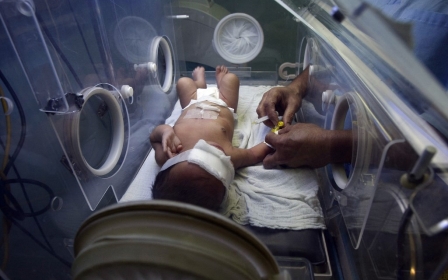Israel elections: Increasingly far-right youth gives an insight into future

Two sectors - or rather age groups - are about to decide the outcome of Israel’s 1 November parliamentary elections: first-time voters and Russian-speaking youth.
This is the fifth round of polls in three years, so the majority of those heading to the ballots for the first time will be 18-year-olds. In the long run, they are the citizens who will form the future of Israel and thus have an impact on the Middle East.
The numbers are surprisingly high: according to the Israeli Central Elections Committee, 209,000 first timers (whose votes will count towards about five out of 120 seats in parliament in Israel's proportional system) joined the Israeli voting cohort between the fourth round in March 2021 and the upcoming round. About 165,000 of these are Jewish voters. Among them are recently recruited soldiers and their orthodox peers who stay away from military service. They share little in Israeli everyday life; they share a lot as a political cohort. Both tend towards the right or radical right - or, in other words are part of what is now known as “Bibi’s bloc”.
Stay informed with MEE's newsletters
Sign up to get the latest alerts, insights and analysis, starting with Turkey Unpacked
The orthodox first timers are solid and dedicated. They follow their rabbis’ orders, and the rabbis say Benjamin Netanyahu. Likud officials in charge of the election campaign, and more importantly election day, trust them as dedicated volunteers just happy to get away from the holy books and bring orthodox voters to the ballots. Yet even that well-established routine now comes with a twist: Itamar Ben-Gvir, the far-right MP of the Religious Zionism party, fascinates quite significant numbers of those youths.
In many ways, he is what they would like to be, and cannot. Even if they choose to violate the rabbis’ instructions and vote for him, their vote remains in the family, meaning in Netanyahu’s bloc. After all, Netanyahu helped get Ben-Gvir into parliament and now has vowed to make him a legitimate and influential member of the next government, if he gets to form it. Ben-Gvir wants the position of minister of public security, and he might get it.
In a recent poll of Russian-speaking Israeli voters, Religious Zionism - the most radical right-wing party in these elections - thrives
The voting patterns of their non-orthodox first-timer peers are more diverse, but not significantly so. Research conducted in July by Midgam, a major Israeli research company, examined voting patterns of voters aged 18 to 25, to see what Israeli politics would look like if this age group was the only one to vote. In that case, Netanyahu’s bloc, which encompasses the far right and ultra-orthodox parties, would get 71 seats in parliament. Forty-six percent of respondents define themselves as “right”, 16 percent as “centre right”, and only 10 percent as “left”. Meretz, the only Zionist party that defines itself as “left”, fails to cross the electoral threshold. Prophesizing is a risky business in the Middle East, but that allows a peek into the future, way beyond 1 November.
Even before that scenario prevails, an unprecedented minor phenomenon captures the spirit of the changing politics in Israel: about 100,000 voters, most of them young, still define themselves as “floating vote”, meaning they have not made up their minds whether to vote for Benny Gantz, the ex-army chief who leads the National Unity Party, or Ben-Gvir, a man so racist the military refused to recruit him.
Generational change
The second group we turn to is the Russian-speaking youth.
For three decades, immigrants from the former Soviet Union were considered the kingmakers in Israeli elections. Now, for the first time since the onset of this huge wave of immigration, the Arab vote is now perceived as the decisive factor in the upcoming elections. Still, the 15 potential seats that the Russian-speaking community's vote can deliver can make a big difference. The politicians to best understand it are Netanyahu and Avigdor Lieberman, finance minister and head of Yisrael Beiteinu, which is still perceived as a “Russian” party.
What both of them seem to miss, however, is the “change of guards” seen when we compare the views of the 720,000 voters born in former Soviet states to the 310,000 children born to them in Israel and now eligible to vote. Those children tend to vote differently from their parents’ generation. Less sectarian interests motivate their vote, and the “national interest” translates into support for more radical right-wing politics.
A recent poll presented for the first time here and conducted exclusively for One Million Lobby, an advocacy group for Russian-speaking Israelis, provides another look at the upcoming elections and beyond. It is not necessarily good news. Likud and Yisrael Beiteinu still lead with almost five seats each; Prime Minister Yair Lapid’s Yesh Atid party follows with less than four seats. Labor and Meretz disappear below the electoral threshold in both generations.
Lieberman’s party gets 30 percent of the “Russian vote” from the parents’ generation, but only 13 from those born in Israel. Religious Zionism, the most radical right-wing party in these elections, thrives. It has just five percent support from the parents’ generation but 13 percent from the younger.
This is, in fact, the most striking finding in the poll. One-third of the ex-Soviet immigrants and their children are not considered Jewish according to rabbinical law, a status that is a major source of anger for the younger generation. Still, many of them choose to subordinate their personal and communal interests to what they perceive as a national interest – which for many of the youth is embodied by the policies of Religious Zionism.
Ukraine absent
One crucial issue is near absent from the elections discourse among both Russian-speaking generations: Russia’s invasion of Ukraine. Until recently, the Russian-speaking community judged Israeli politicians by their stance on this issue. It seemed to be a dealbreaker for the community, for whom the war was not a political issue but rather a source of personal pain.
Over the past weeks, however, Ukraine has become more of a background noise. Few refer to Lieberman’s cautious distancing from the conflict. Those Russian-speaking voters migrating to Netanyahu’s Likud party since the last election also pay little attention to the fact the former prime minister sounded almost like Vladimir Putin’s partner in a recent interview with MSNBC.
For those who still care deeply about the war, he was quick to “adjust” his position. As a minor pro-Ukraine demonstration was held in Jerusalem, Netanyahu told USA Today that he believes “if elected, he will be asked to serve as mediator between Russia and Ukraine and will look into supplying weapons to Ukraine”.
It was a cynical last-minute attempt to reach out to the large community of Ukrainian Israelis, too little and too late. The remote sounds of that war were probably silenced by the renewed noise of violence both in Israel and in the occupied Palestinian territories, and the fear campaign Netanyahu himself conducts indirectly. That always serves well the politics of the right wing in Israel.
Middle East Eye delivers independent and unrivalled coverage and analysis of the Middle East, North Africa and beyond. To learn more about republishing this content and the associated fees, please fill out this form. More about MEE can be found here.






